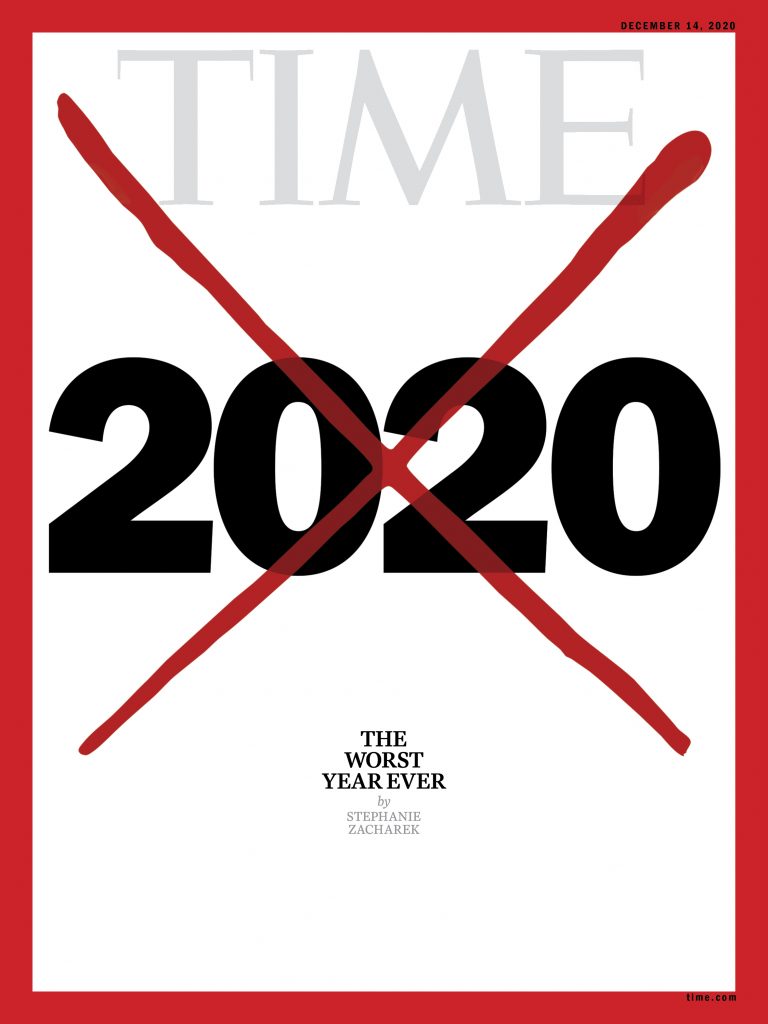
2020 has been a dumpster fire.
This week an Indianapolis resident hauled a dumpster into his front yard and invited his neighbors to record their feelings about the current calendar year. Some scrawled “good riddance.” Others recorded jokes, jingles, and borderline poetry. At least one resorted to expletives. In a few days the dumpster’s trashy contents will be ceremonially torched as a symbolic farewell to the last 12 months.
The cover of Time magazine’s December 14 issue is simple and straightforward: A giant X through the number 2020 floating above the caption “The Worst Year Ever.”
Numerous Americans are old enough to remember World War II; the Cold War; Vietnam; the assassinations of JFK, RFK, and Martin Luther King, Jr.; Watergate. Younger generations recall the Wall Street debacles of 1987 and 2008; the 9/11 terror attacks; and the ongoing conflicts in the Middle East.
Is this really the worst year ever?
Most of us will look back on 2020 as a seemingly never-ending assault on public health, economic stability, social justice, political civility, family connections, and personal mobility. Two out of five Americans report a deterioration of mental and emotional health. Many of us have experienced stretches of isolation and uncertainty.
As if that weren’t enough, as 2020 staggers to the finish line the winter solstice reminds us that this is literally the darkest time of the year.
But then we remember the words of the novelist Walker Percy: “It gets darker and darker, then Jesus is born.”
It’s fascinating how often darkness appears in the original Christmas accounts, and in the songs that we sing every December.
Advent traditionally begins with these words from the Old Testament prophet: “The people walking in darkness have seen a great light; on those living in the land of deep darkness a light has dawned.” (Isaiah 9:2) In the very first paragraph of the fourth Gospel we read, concerning Jesus: “In him was life, and that life was the light of all mankind. The light shines in the darkness, and the darkness has not overcome it.” (John 1:4,5)
The Episcopal vicar Phillips Brooks was moved by an experience of darkness during his visit to the village of Bethlehem in 1865.
Standing in the traditional Field of the Shepherds, he watched the shadows of night fall upon the ancient streets. Three years later he transformed his memories into lyrics that became O Little Town of Bethlehem.
Brooks asked his church organist, Lewis Redner, to write a tune simple enough for Sunday School kids to sing. He even promised Redner that if the tune was a hit he would give it the formal name “St. Lewis.”
The organist had no compelling ideas until the night before the service in which the song was supposed to debut. Awakening from a deep sleep, he scribbled the familiar notes. Then he fell back to sleep without even sounding them out. Brooks loved the melody so much that he kept his promise. But as a concession to Redner’s humility, he christened the tune “St. Louis” instead of “St. Lewis.”
With its lilting, peaceful phrases, O Little Town of Bethlehem is one of the gentlest of all the traditional carols.
The end of Brooks’ first verse is powerful: “the hopes and fears of all the years are met in thee tonight.”
In every age, in every place, in every heart, there are reasons to be afraid. We may actually conclude that we are living during the Worst Year Ever. But when hopes and fears intersect in the presence of Jesus, hope wins. In a world where it sometimes seems that darkness might be getting the upper hand, “where meek souls will receive him still,” God offers the grace and peace we desperately need:
O little town of Bethlehem, how still we see thee lie! Above thy deep and dreamless sleep the silent stars go by.
Yet in thy dark streets shineth the everlasting Light; the hopes and fears of all the years are met in thee tonight.
How silently, how silently the wondrous gift is given! So God imparts to human hearts the blessings of his heaven.
No ear may hear his coming, but in this world of sin, where meek souls will receive him still, the dear Christ enters in.
O holy Child of Bethlehem! Descend to us, we pray; cast out our sin and enter in, be born in us today.
We hear the Christmas angels the great glad tidings tell; O come to us, abide with us, our Lord Emmanuel.
Here’s a quiet instrumental version of a carol that helps us remember that the true Light still shines.
Even when the world seems very, very dark.
